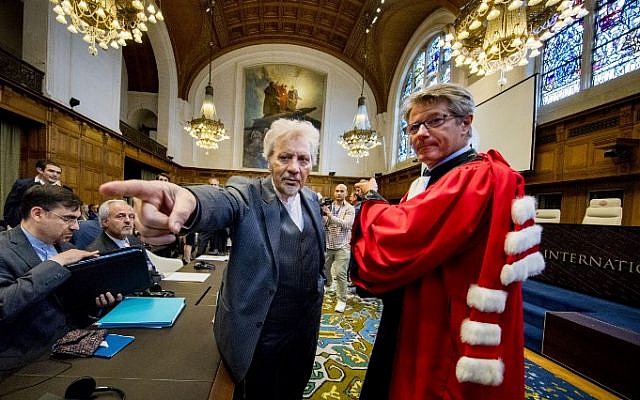THE HAGUE, Aug 27, 2018 (BSS/AFP) – Iran on Monday demanded the UN’s top
court suspend US nuclear-linked sanctions against Tehran, accusing Washington
of plotting its “economic strangulation”.
The Islamic Republic launched a suit at the International Court of Justice
over US President Donald Trump’s decision to reimpose the sanctions that had
been lifted in a 2015 accord.
Iran says Trump’s move breaches a 1955 treaty.
Trump says the sanctions are needed to ensure Iran never builds a nuclear
bomb. But Iran’s representative Mohsen Mohebi branded them “naked economic
aggression”.
His team of lawyers told the court in The Hague the measures were already
devastating Iran’s economy and threatening the welfare of its citizens.
“The United States is publicly propagating a policy intended to damage as
severely as possible Iran’s economy and Iranian nationals and companies,”
Mohebi said.
“Iran will put up the strongest resistance to the US economic
strangulation, by all peaceful means.”
– ‘Irreparable prejudice’ –
The US measures have added to Iran’s economic woes, fuelling strikes and
protests across the country and political spectrum.
The sanctions target financial transactions and imports of raw materials,
cars and aircraft among other things.
A second wave of punitive measures is due to hit Iran in early November,
targeting its vital energy sector including oil exports.
Iran’s lawyers said the sanctions would cause it “irreparable prejudice”.
They urged the court to order the suspension of the sanctions pending a
definitive ruling.
British lawyer Samuel Wordsworth, for Iran, told the court the sanctions
were threatening Iranians’ access to medicines as well as disrupting business
deals.
Jean-Marc Thouvenin, law professor at University of Paris Nanterre, added:
“It is urgent that the court indicate provisional measures that safeguard
Iran because the purpose (of sanctions) is to strangle the Iranian economy
within a few months.”
– ‘One-sided deal’ –
The ICJ is expected to take a couple of months to decide whether to grant
Tehran’s request for a provisional ruling. A final decision could take years.
The 2015 deal was signed by Iran and the five permanent members of the
United Nations Security Council plus Germany.
Sanctions were lifted in return for Iran committing not to pursue nuclear
weapons.
Trump, who took office in 2016, called it a “horrible one-sided deal”.
He said it “failed to achieve the fundamental objective of blocking all
paths to a Iranian nuclear bomb.”
To the horror of the other signatories, he pulled out of the accord and
announced in May that he would reinstate sanctions.
– ‘Neither war, nor negotiations’ –
Iran’s lawyers said the US sanctions threatened tens of billions of
dollars’ worth of business deals with foreign companies.
Iran’s currency the rial has lost around half its value since April.
International companies including French oil firm Total and Germany’s
Siemens have suspended operations in Iran since Trump announced the US
withdrawal in May.
Trump said the sanctions would turn up the financial pressure on Tehran to
come to a “comprehensive and lasting solution” regarding its activities such
as its “ballistic missile programme and its support for terrorism”.
The case is the second brought by Tehran against Washington since 2016.
That year it brought a suit at the ICJ against the freezing of around $2
billion of Iranian assets abroad which US courts say should go to American
victims of terror attacks.
Hearings in that case are due to start on October 8.
Despite the 1955 Treaty of Amity and Economic Relations between Iran and
the United States, the two countries have not had diplomatic ties since 1980.
The court adjourned after Monday’s hearing, with Washington’s lawyers
scheduled to present their case on Tuesday. Experts expect them to challenge
the ICJ’s jurisdiction.
A second round of arguments follows on Wednesday and Thursday.



